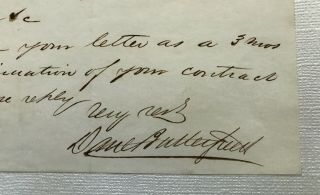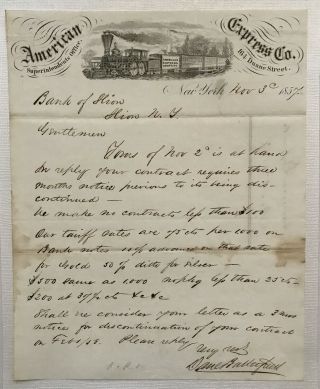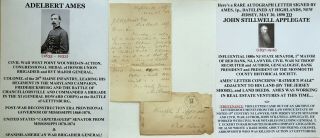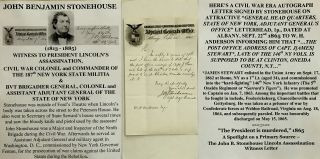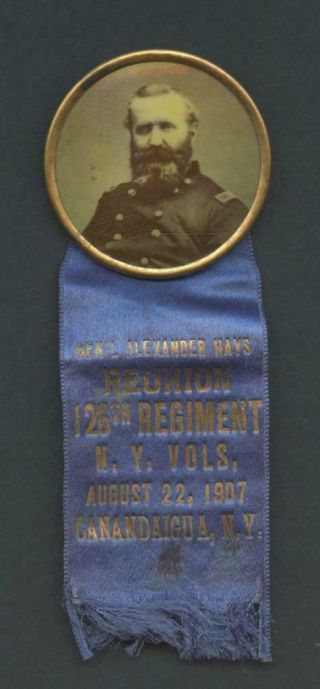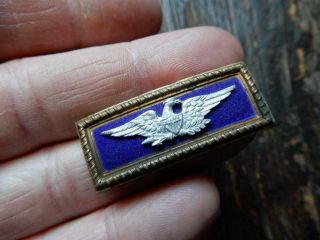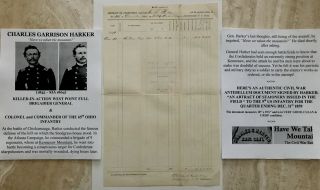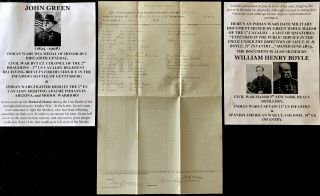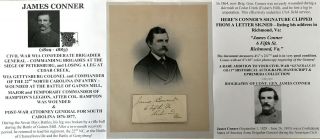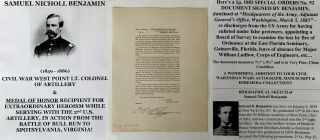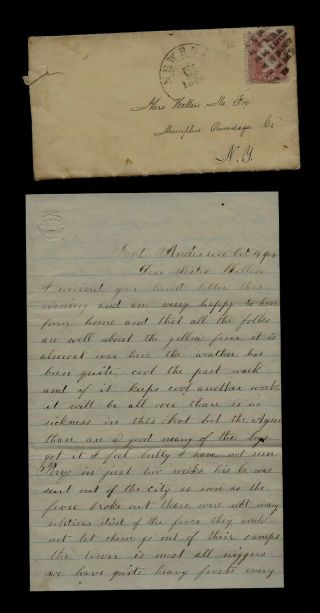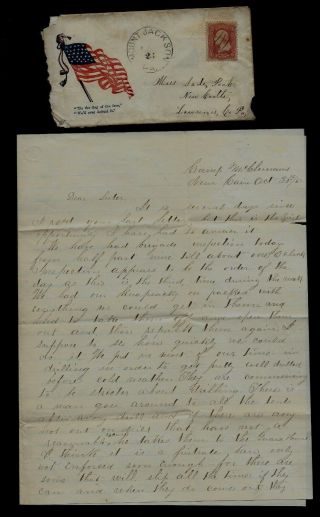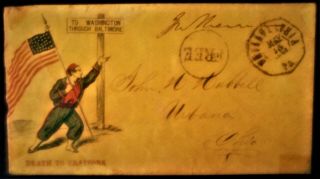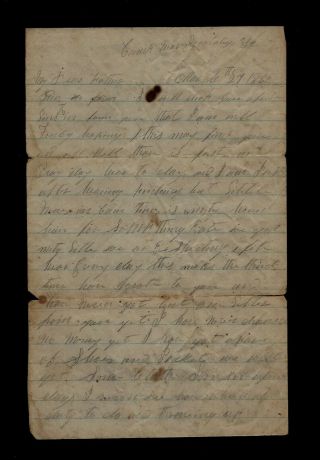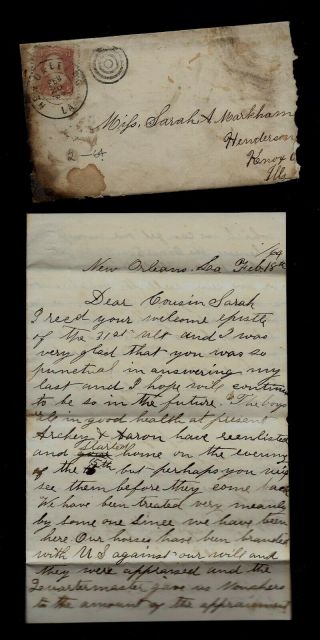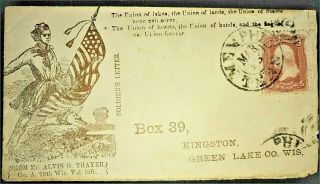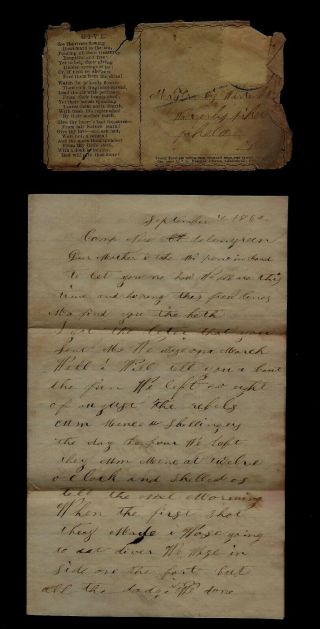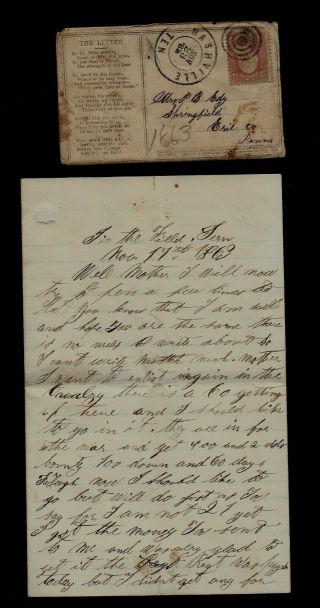CIVIL WAR WIA MEDAL HONOR GENERAL COLONEL 12th NY INFANTRY AMEX LETTER SIGNED VF
Item History & Price
(1831 – 1901)CIVIL WAR WOUNDED IN ACTION MEDAL OF HONOR MAJORGENERAL, COLONEL and COMMANDER OF THE 12th NEW YORKINFANTRY, ASSISTANT US TREASURER APPOINTED BY PRESIDENT GRANT –ABUSING HIS POSITION TO MANIPULATE THE PRICE OF GOLD COMMODITIES IN 1869&SUPERINTENDENT OF AMERICAN EXPRESS!Butterfield is creditedwith arranging the bugle call called “Taps.” In later life, he wasinvolved in the Black Friday Gold Scandal in President Grant’s administration as ...Asst Treasurer!HERE'S A VERYRARE AUTOGRAPH LETTER SIGNED BY BUTTERFIELD ON ATTRACTIVE "AMERICAN EXPRESS Co., SUPERINTENDENTS OFFICE”STEAM ENGINE TRAIN ILLUSTRATED LETTERHEAD, 1p., DATELINED 164 DUANE STREET, NEWYORK, NOV. 3rd 1857 TO THE BANK OF ILION, NY, REGARDING THREE MONTHSNOTICE TO DISCONTINUE AN AMEX COMPANY CONTRACT WITH THE BANK.Thedocument measures 8" x 10" and is in VERY FINE CONDITION!A RARE ADDITIONTO YOUR CIVIL WAR “GENERALS IN BLUE” AUTOGRAPH, MANUSCRIPT & EPHEMERA COLLECTION!<>>::<<>BIOGRAPHICAL SKETCH OF CIVIL WARGENERAL DANIEL BUTTERFIELDButterfield, Daniel (31 Oct. 1831-17 July 1901), soldier and businessman, was born in Utica, New York, the son of John Butterfield, a businessman, and Malinda HarrietBaker. From his father, president of the Overland Mail and partner in theAmerican Exp Company, Butterfield acquired an interest in organizing andadministering business corporations. He attended private academies beforegraduating at eighteen from Union College. Following a brief attempt to studylaw, he traveled extensively in the South, where he foresaw sectional conflict.In 1857 he married Elizabeth (full name unknown); they had no children. Shedied in 1877. Moving to New York City in 1850 or1851, Butterfield entered the family business as superintendent of the easterndivision of American Express. In his spare hours, he became involved in NewYork militia affairs; by the outbreak of the Civil War he was colonel of theTwelfth New York State National Guard. In April 1861 he offered his regiment toRepublican governor Edwin D. Morgan, but Morgan declined to accept it untilSecretary of State William H. Seward, father of one of Butterfield'sclassmates, intervened in the colonel's behalf. Butterfield recruited the Twelfth NewYork to proper strength in a matter of days. Late in April he led the outfit tothe defense of the U.S. capital, where it was mustered into Federal service fora term of ninety days. On 24 May, only hours after a state referendum ratifiedVirginia's ordinance of secession, the Twelfth became the first regiment tocross the Potomac, spearheading a column that occupied Alexandria. Shortly after his regiment's term ofservice ended in early August, Butterfield was nominated brigadier general ofvolunteers and received command of a V Corps brigade in Major General George B.McClellan's Army of the Potomac. Despite his lack of field experience, the newbrigadier performed gallantly during the Peninsula campaign. On 27 June 1862, at Gaines's Mill, Butterfield rescued the colors of an embattled regiment andled the outfit in a counterattack. His heroics gained him a painful wound butalso a Medal of Honor, awarded thirty years after the deed. At Malvern Hill, 1July, Butterfield's brigade guarded McClellan's rear during his retreat to theJames River. While the army nursed its wounds atHarrison's Landing, Butterfield spent his off-hours composing bugle calls. Hismost famous effort occurred when he revised a lights out call that had appearedin military manuals as early as 1835, lengthening and reemphasizing some of itsnotes. When his brigade bugler substituted the revised call, it became animmediate favorite in the army; later it was adopted by other Union andConfederate commands as well. Although not an original composition, "Butterfield's Lullaby" has come down through history as"Taps, " the haunting melody that beckons soldiers, living and dead, to their rest. From the James, Butterfield's brigadewas transferred to northern Virginia, where, on 30 August, it launched a costlyand ineffective attack against the Confederate left flank at Second Manassas(Bull Run). Illness kept Butterfield out of action at Antietam, although herecovered to lead a V Corps division, then the corps itself. By November he wasa major general of volunteers. One headquarters observer declared that staunchRepublican Butterfield had been promoted "faster than almost any othercivilian who has not been an avowed political appointment." At Fredericksburg, 13 December, Butterfield's corps suffered 2, 440 casualties attacking impregnable enemypositions. In the aftermath of the fiasco, he reverted to divisional command, ademotion he ascribed to army politics. Partly as a result, in January 1863 heleft the field to serve as chief of staff to Major General Joseph Hooker, thenew army leader. Butterfield forged an uneven record as a staff officer. Hehandled paperwork efficiently and devised a system of corps badges (based on anidea by Major General Philip Kearny) that helped raise morale throughout thearmy. On many occasions he also made himself obnoxious to Hooker'ssubordinates, winning the nickname "Little Napoleon." Some observersconsidered him a bad influence on Hooker, who had a weakness for women andalcohol. The commander of Hooker's escort claimed that, owing partly toButterfield, "the headquarters of the Army of the Potomac was a place towhich no self respecting man liked to go and no decent woman could. It was acombination of bar-room and brothel." During the Chancellorsville campaign, Butterfield tried with limited success to coordinate operations between twowings of Hooker's army. After the Union defeat cost Hooker his job, Butterfieldstayed on to serve Major General George Gordon Meade during the battle ofGettysburg. Butterfield played a prominent role in framing the agenda of acouncil of war at Meade's headquarters on 2 July, at which the army's seniorleaders voted to fight at Gettysburg for a crucial third day. In later months, Butterfieldprecipitated a long-lived controversy by claiming that Meade had ordered him todraw up a plan to retreat from Gettysburg, which the army leader intended toimplement even after the battle began. While conceding that he may haveempowered the staff officer to plan a fallback as a contingency option, Meadedenied to a congressional committee that he had intended to quit the field oncethe fighting started. Most historians have accepted Meade's word, regardingButterfield's accusation as the result of a genuine misunderstanding or as a deliberatefalsehood prompted by personal animosity (Meade had deposed Butterfield incommand of the V Corps after Fredericksburg). In any case, when the chief ofstaff left the army on 3 July after taking a minor wound, Meade replaced him, quickly and permanently. When Hooker was reinstated to fieldcommand and sent west in September 1863, the recently recovered Butterfieldaccompanied him to his new station. Butterfield's experience in transportationmanagement enabled him to plan the transfer of Hooker's XI and XII Corps fromVirginia to Tennessee, one of the most complex logistical undertakings of thewar. In the West, Butterfield served as Hooker's chief of staff throughout theChattanooga campaign before returning to field service in April 1864 as commanderof the Third Division, XX Corps, Army of the Cumberland. Butterfield saw actionduring much of the Atlanta campaign before dysentery forced him to take sickleave. After recovering at his summer home at Cold Spring, New York, he waslimited to court-martial duty and special assignments for the War Department. In July 1863 Butterfield had gained aplum appointment as colonel of the Fifth U.S. Infantry. In January 1866 he wastendered command of installations in New York Harbor as well as the superintendencyof the General Recruiting Service of the U.S. Army. In March 1870 Butterfieldresigned his commission to become director of the U.S. Subtreasury in New YorkCity. In later years he was involved in railroad construction, real estate, andbanking. He ran unsuccessfully for Congress in 1892, traveled, wrote articleson history, and helped plan and supervise numerous military and civiliancelebrations. He died at Cold Spring, survived by his second wife, JuliaLorrilard James, but no children. Butterfield's rapid rise in thevolunteer service and his regular army appointments cannot be reconciled withhis limited talent as a field commander. Family prominence, high rank in themilitia, and political connections appear to have been responsible. His managerialand organizational talents served him well as a staff officer, although hisofficiousness and his sometimes abrasive personality weakened his usefulness asa liaison between army headquarters and subordinate commanders. Despite hisprominent position in the Union hierarchy, despite serving in importantcampaigns in the two major theaters of operations, and despite winning a Medalof Honor, he is remembered chiefly--but inaccurately--as the composer of"Taps." [SOURCE: American National Biography]<> THEGENERAL DANIEL BUTTERFIELD CIVIL WAR COLLECTIONLocated at the Julia L Butterfield Memorial Library in Cold Spring, NewYork, the archives include correspondence from Union generals, telegraphs fromSecretary of War Stanton and Gen. Sherman as he approached Atlanta, a battlemap of Gettysburg, handwritten casualty lists, a manuscript by a field officerdetailing the Battle of Gettysburg, and other material. Bequeathed to the library by his widow in 1927, the collection'shistorical significance was not known until April 2011 when the West PointMuseum Director & Chief Curator David Reel reviewed the collection.According to Reel, "The historical importance of the collection isunquestionable as a comprehensive archive of a major figure of the American CivilWar and contains documents and letters, telegrams from 1861-64 that areirreplaceable and significant in content. . . No doubt, scholars of UnitedStates History and specifically the American Civil War will find a treasuretrove of original, period material within the archive.”BUTTERFIELD’SLEGACYButterfield has also been memorialized in the novel The Killer Angels by Michael Shaara—a character in the 20thMaine claims that their brigade bugle call waswritten by Butterfield and is based on his own name. He was also referenced inthe movie Glory.There is a statue of the general by Gutzon Borglum in Sakura Park in Manhattan (Riverside and122nd Street).The Butterfield Paramedic Institute in Cold Spring, NewYork, which was once a hospital, is named for him. <> THE STORY OF GEN. DANIEL BUTTERFIELD’SMEDAL OF HONORGainesMill, VA
June 27, 1862TWOGALLANT OFFICERS THE following story, describing an important movement in the action at Gaines Mills, Va., June 27, 1862, is written by a captain of the Eighty-third Pennsylvania Infantry, who testifies warmly to the gallant conduct and able leadership of General Daniel Butterfield and Major Ernst Von Vegesack, and the inspiriting influence upon the men of their fine example. "The Twelfth and Forty-fourth New York Volunteers, who were deployed in the rear and on the heights in the woods above us, opening fire upon the enemy, the fire was returned, and the right wing of the Eighty-third, being more on a level and in view of the enemy, commenced also a heavy fire. The enemy still approached in column of brigade, covered by a regiment in line of battle, but discovering, when too late, the position our regiment held, precipitately fled back with a heavy loss in killed and wounded. "At this moment Brigadier-General Butterfield, amidst a gallant fire from his line of support in the rear, and that of the enemy in front, came coolly down the knoll, and, sword in hand, seized the colors, waving them repeatedly aloft, encouraging the valor of our regiment and stimulating with new vigor our thinned ranks. 'My boys, ' he shouted, 'Your ammunition is never expended while you have your bayonets, and use them to the socket!' "The battle at this juncture raged furiously. The trees were lopped and the leaves fell as thick as snowflakes, while the balls flew like a hailstorm, the solidshot, grape, canister, and shrapnel scattering destruction in all directions. It was intimated that the regiments on our right had been repulsed and had given way under the destructive fire of the enemy, who also threatened our right flank and were at that moment gradually gaining the rear. In this situation one regiment was ordered to face by the rear rank and wheel obliquely by a quarter on the proper right, and then become the left. This manoeuvre was rapidly executed, but during its performance, our commander, Colonel McLane, was killed, and Major Nagel mortally wounded. "The enemy, being fairly driven from the woods, as a last resort made their final stand on their own chosen ground. Major Von Vegesack, who was serving voluntarily as aide, came galloping along our lines, and, in a voice never to be forgotten, ordered the Eighty-third to face by the right flank, advance, half to the left, thereby still keeping the rear rank in front, deep on the center, and again face the foe. This cool and determined move on the part of Major Von Vegesack, which cannot be too warmly appreciated by the Eighty-third, so astounded the enemy, who were drawn up in line at about a hundred yards distance, that they remained perfectly motionless for several minutes. They waved signals, which we did not understand, and finally sent forward a flag of truce, the Eighty-third sending out an officer to receive their communications, which were to the effect that they considered themselves so powerful that we had better surrender. "This proposition, I need hardly say, caused some indignant mirth among us, and before the officers of the Eighty-third, who bore our flag of truce, returned to the ranks, the rebels, contrary to the rules of civilized warfare, poured a deadly volley into the ranks of our regiment. We fell flat on the ground, then rising to our knees, returned the fire, which was kept up in the bravest and most determined manner against overwhelming numbers, keeping the enemy at bay until dark, when the total expenditure of our cartridges caused us to retreat across the Chickahominy River." [The "Seven Days'" Battle before Richmond commenced with the battle of Oak Grove, on the 25th of June, when General Lee's attack on the right wing was made without decisive results. In an engagement at Mechanicsville on the 26th, General Hill, of the Confederate Army, was repulsed, with considerable loss, by the Sixth Corps under Porter.] Source: Deeds of Valor I am a proud member of theUniversal Autograph Collectors Club (UACC), The Ephemera Society of America, the Manuscript Society and the American Political Items Collectors (APIC)(member name: John Lissandrello). I subscribe to each organizations' code of ethicsand authenticity is guaranteed. ~Providing quality service and historicalmemorabilia online for over twenty years.~
WE ONLY SELL GENUINE ITEMS, i.e., NO REPRODUCTIONS, FAKES OR COPIES!




